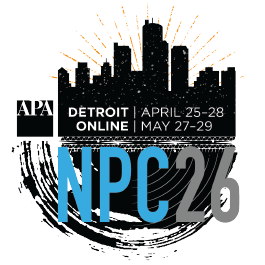Denver, Colorado | March 29–April 1, 2025
Online | April 23-25, 2025
NPC25 Delivers Innovative Planning Education
NPC25 prioritizes comprehensive education, offering a diverse range of sessions and workshops designed to address the latest trends, challenges, and innovations in urban planning. Attendees can expect to engage with thought leaders, practitioners, and experts who share their insights on hot topics in and around planning today. Explore the curated offerings that cater to planners at all career levels.
The NPC25 program is continuously being updated with new events and sessions. Please check back regularly for the latest information.
Keynote Speakers

Opening: Dr. Mary Beth Janke
We're excited to kick off the conference with our keynote speaker, who will set the stage for a weekend of innovation and connection. Whether you're attending in-person or virtually, the keynote will provide motivation to help you embrace challenges, master new skills, and drive impactful change in your community. You won't want to miss this invigorating session to start your NPC25 experience!
Dr. Mary Beth Janke has over 30 years of experience in psychology, security, and investigative work. As a psychologist, she has supported individuals facing anxiety, trauma, and domestic violence, while researching self-esteem in young women and developing a Stalking Risk Assessment Prototype. She started her career as a Special Agent with the U.S. Secret Service, becoming the only woman to protect a foreign president abroad. She also led inquiries into "Iraqgate" and contributed to coverage of the Duke Lacrosse scandal. She holds a Doctorate in Clinical Psychology from Widener University and a Master's in Forensic Psychology from John Jay College., and has taught "Abnormal Psychology" and the "Psychology of Crime and Violence" at George Washington University.
In 2022, Dr. Janke gave a TEDx Talk, "How to Live a Badass Life at Any Age," emphasizing self-discipline, self-respect, and empowerment.
She now consults in forensic and clinical psychology, specializing in threat assessment and protective security. Her memoir, The Protector: A Woman's Journey from the Secret Service to Protecting VIPs in the World's Most Dangerous Places, was published in 2020.

Closing: Leah Rothstein
Leah Rothstein is the co-author of JUST ACTION: How to Challenge Segregation Enacted Under the Color of Law, which describes how local community groups can redress the wrongs of segregation.
Leah has worked on public policy and community change, from the grassroots to the halls of government. She led research on reforming community corrections policy and practice to be focused on rehabilitation, not punishment. She has been a consultant to nonprofit housing developers, cities and counties, redevelopment agencies, and private firms on community development and affordable housing policy, practice, and finance. Her policy work is informed by her years as a community organizer and labor organizer, working on issues such as housing, environmental justice, workplace safety, and youth leadership.
She also writes a regular column, which you can subscribe to for free at JustAction.substack.com.
NPC25 Sessions Formats
NPC25 offers a range of sessions and workshops to fit your interests and goals. And with various formats available, you can learn in the way that works best for you. From engaging panel discussions to bite-size presentations, and even hands-on activities, each format is designed to provide unique insights and build connections.
Here's a look at the different sessions and formats: Lightning Talk (5 minutes each; in-person only)
Hear inspiring success stories and innovative ideas during 12 quickfire presentations. These short talks cover a variety of topics that will capture your attention and keep you hooked.
Innovation Talk (15 minutes each; in-person only)
Discover how planners are tackling current challenges with new methods and tools. These sessions will have you thinking outside the box, and you'll walk away with tips you can use in today's ever-changing environment — and the future.
Open Fishbowl (45 minutes; in-person only)
In this unique small group setting, you'll have a front-row seat to a thoughtful discussion or debate as participants rotate in and out of the inner circle. Whether you're just listening in, or want to jump into the conversation, you'll be a part of a lively fishbowl where all ideas are welcome.
Standard Slide Presentation (45 minutes; in-person or online)
Learn about exciting planning projects that address real-world problems. From the first brainstorm to the final execution, you'll get a great feel for the entire planning journey. Along the way, you'll explore helpful tools, methods, and strategies that you can apply to your studies and work.
Panel Discussion (45 minutes; in-person or online)
Hear from a diverse group of experts from different organizations, each bringing their background and perspective to a central topic. You'll be part of the conversation, with plenty of time for your questions during the lively Q&A at the end.
AICP Mandatory Credit (60 minutes; in-person or online)
Take a step toward advancing your professional development and earn CM. AICP requires all certified planners to complete four key topics: Law, Ethics, Equity, and Sustainability & Resilience. We've made it easy to earn those credits through these sessions, designed to provide valuable insights into today's planning world.
Learning Lab (90 minutes; in-person only)
Mix things up with this fun interactive session, where you get to collaborate, share ideas, and join the discussion. This is your chance to get hands-on and work with your peers to brainstorm, plan, and come up with creative solutions to real challenges.

